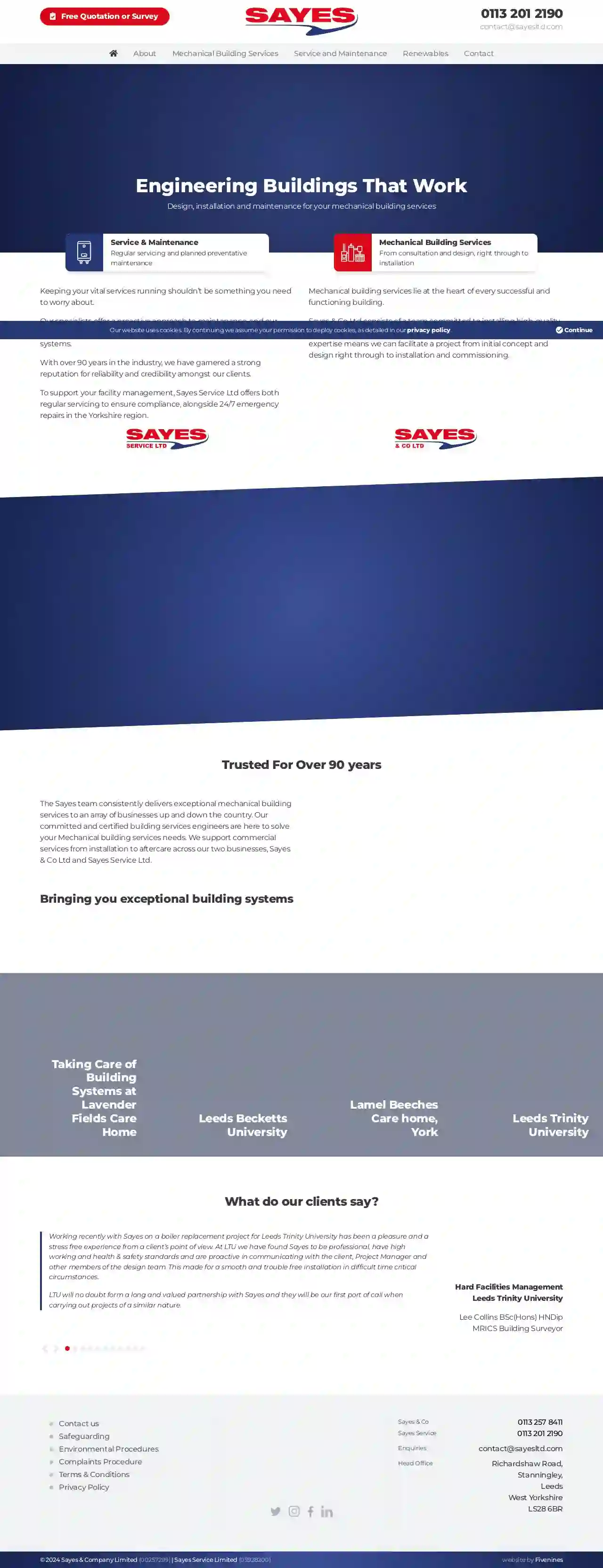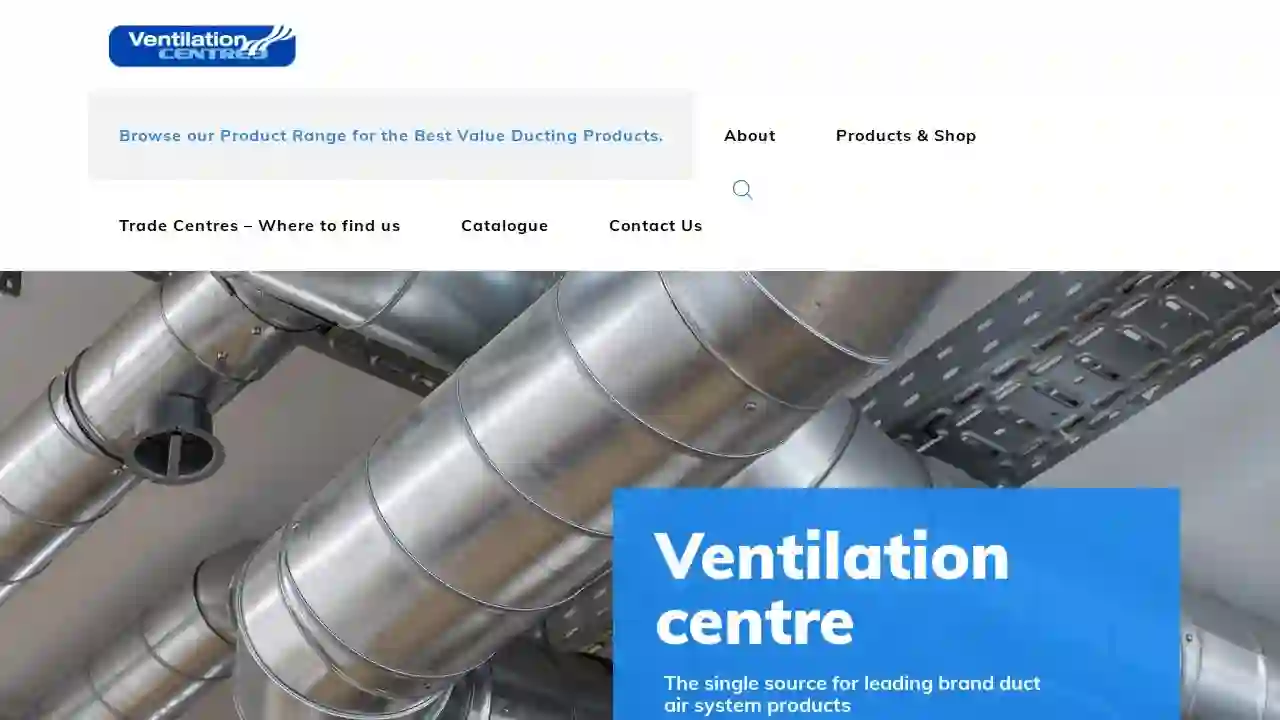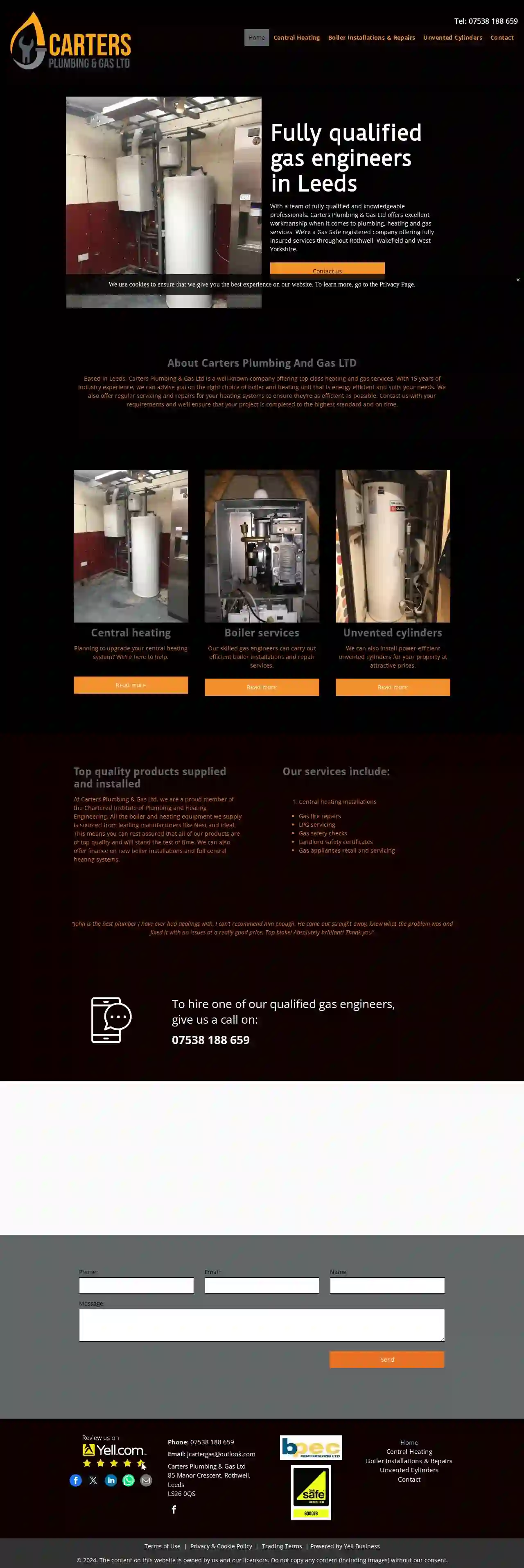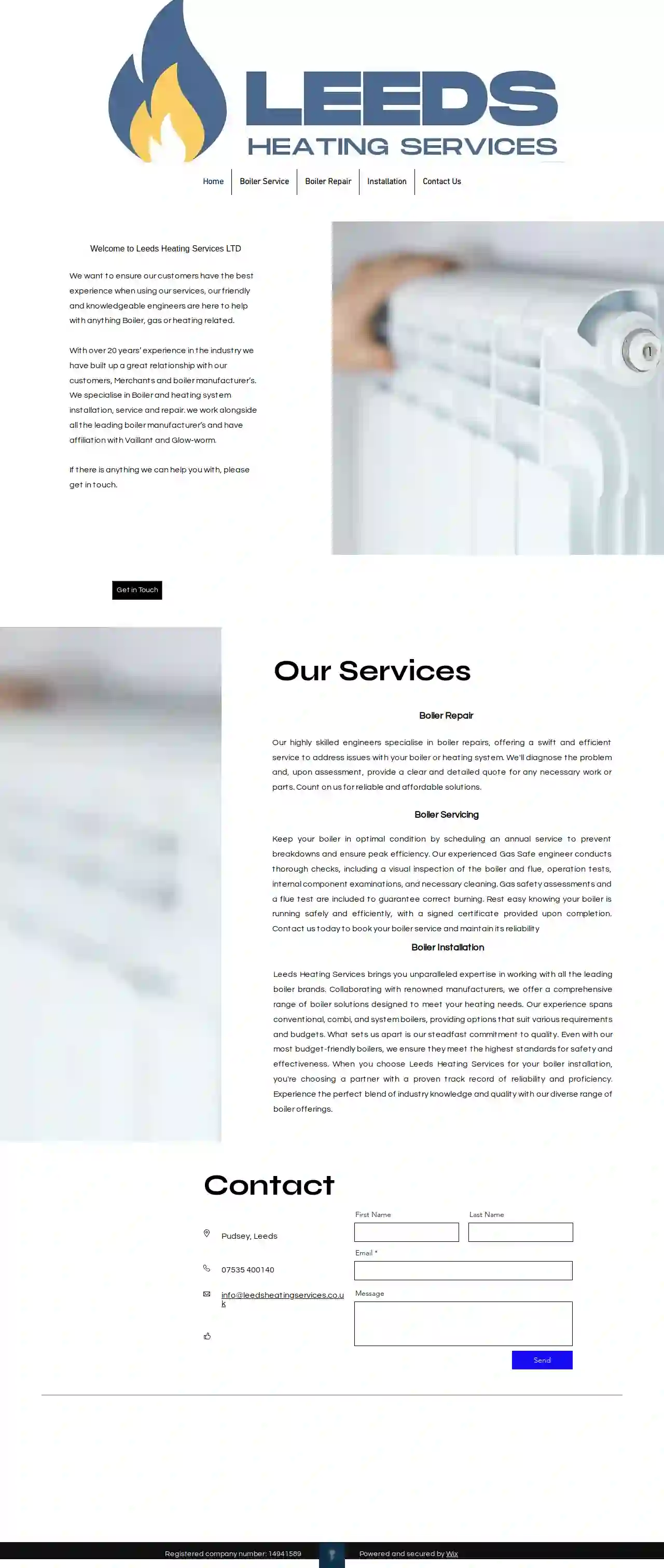HVAC Companies Drighlington
Find top Air Conditioning Services in Drighlington
Get 3 FREE HVAC Contractor quotes for your project today! Compare profiles, reviews, accreditations, portfolio, etc... and choose the best service.

Altherm Air Conditioning & Refrigeration Leeds
Tower Court, Oakdale Rd, Clifton Moor, York, YO30 4XL, GBAltherm is a family-run business dedicated to providing energy-efficient air conditioning solutions for homes and businesses across York, Harrogate, and North Yorkshire. With a focus on modern and sustainable heating and cooling systems, Altherm offers a comprehensive service from design and installation to ongoing maintenance and support. They pride themselves on building strong relationships with clients, ensuring 100% satisfaction through a first-class service and excellent aftercare. Altherm stays at the forefront of industry advancements, constantly updating their knowledge and equipment to deliver the highest quality, reliable, and environmentally friendly solutions.
- Services
- Why Us?
- Gallery
Get Quote
City refrigeration and air conditioning
51 reviews123 High Street, Oxford, OX1 1AA, GBCity Refrigeration and Air Conditioning is a leading provider of refrigeration and air conditioning services in the UK. With over 20 years of experience, our team of experts has the knowledge and skills to provide a wide range of services, from installation and maintenance to repair and replacement. We pride ourselves on our commitment to customer satisfaction, and our goal is to provide the highest level of service to our clients. Whether you need a new system installed, or your existing system repaired, we are here to help.
- Services
- Why Us?
- Accreditations
- Our Team
- Testimonials
Get Quote
Sayes Service Limited
Leeds, GBSayes & Co Ltd is a company with over 90 years of experience in providing mechanical building services. They offer a range of services including estimation and quotations, industrial and commercial installation, design and coordination, project management, and service and maintenance. Their team of specialists is committed to delivering exceptional mechanical building services to businesses across the country. They have a strong reputation for reliability and credibility amongst their clients and offer both regular servicing and 24/7 emergency repairs in the Yorkshire region.
- Services
- Why Us?
- Testimonials
- Gallery
Get Quote
Airedale International Air Conditioning Ltd
4.77 reviewsLeeds, GBAt Airedale by Modine, we believe that air conditioning has a critical role to play in an ever-changing world. We also passionately believe that air conditioning manufacturers must play a responsible role in an era where sustainability is key to the preservation of our planet. Whether you need to maintain productive and healthy working environments for people or optimised operating envelopes for critical equipment in data centres and other industries, Airedale by Modine delivers a tailored solution based on world-class products, industry-leading design, intelligent software, and unrivalled end-to-end customer support.
- Services
- Why Us?
- Gallery
Get Quote
Ventilation Centre Ltd
11 reviews1000 Chester Road, Unit 10, The Business Centre, Birmingham, B37 7AA, GBVentilation Centre is a leading supplier of ventilation products and systems in the UK. We offer a wide range of solutions for both domestic and commercial applications, including air conditioning, heat recovery, and air purification. Our team of experts has over 20 years of experience in the industry and is dedicated to providing our customers with the highest quality products and services. We are committed to delivering innovative and sustainable solutions that meet the evolving needs of our clients. At Ventilation Centre, we understand the importance of good indoor air quality. Our products are designed to improve ventilation, reduce allergens, and create a healthier and more comfortable environment. We work closely with our customers to understand their specific requirements and provide tailored solutions that meet their individual needs. We are proud to be a trusted partner for businesses and homeowners alike. Our commitment to excellence has earned us a reputation for reliability, quality, and customer satisfaction. We are constantly striving to improve our products and services and to exceed the expectations of our clients.
- Services
- Why Us?
- Accreditations
- Our Team
- Testimonials
Get Quote
ICH Services
4.522 reviewsRoker Lane, Union Bridge Works, LS28 9LE, GBICH Services provide hard facilities services throughout the United Kingdom. Through management of all types of mechanical maintenance, ICH Services are able to offer complete peace of mind for a single building to a multi property estate. ICH have a proven track record being different to their competitors. Being maintenance led validates their unique obsession with client care. ICH strive to develop long term relationships with all clients, and this year celebrate 29 years in business.
- Services
- Why Us?
- Gallery
Get Quote
Carters Plumbing & Gas Ltd
57 reviews85 Manor Crescent, Rothwell, LS26 0QS, GBFully qualified gas engineers in Leeds With a team of fully qualified and knowledgeable professionals, Carters Plumbing & Gas Ltd offers excellent workmanship when it comes to plumbing, heating and gas services. We’re a Gas Safe registered company offering fully insured services throughout Rothwell, Wakefield and West Yorkshire. Contact us About Carters Plumbing And Gas LTD Based in Leeds, Carters Plumbing & Gas Ltd is a well-known company offering top class heating and gas services. With 15 years of industry experience, we can advise you on the right choice of boiler and heating unit that is energy efficient and suits your needs. We also offer regular servicing and repairs for your heating systems to ensure they’re as efficient as possible. Contact us with your requirements and we’ll ensure that your project is completed to the highest standard and on time. Central heating Planning to upgrade your central heating system? We're here to help. Read more Boiler services Our skilled gas engineers can carry out efficient boiler installations and repair services. Read more Unvented cylinders We can also install power-efficient unvented cylinders for your property at attractive prices. Read more Top quality products supplied and installed At Carters Plumbing & Gas Ltd, we are a proud member of the Chartered Institute of Plumbing and Heating Engineering. All the boiler and heating equipment we supply is sourced from leading manufacturers like Nest and Ideal. This means you can rest assured that all of our products are of top quality and will stand the test of time. We can also offer finance on new boiler installations and full central heating systems. Our services include: Central heating installations Gas fire repairs LPG servicing Gas safety checks Landlord safety certificates Gas appliances retail and servicing "John is the best plumber I have ever had dealings with, I can’t recommend him enough. He came out straight away, knew what the problem was and fixed it with no issues at a really good price. Top bloke! Absolutely brilliant! Thank you" To hire one of our qualified gas engineers, give us a call on: 07538 188 659
- Services
- Why Us?
- Accreditations
- Our Team
- Testimonials
- Gallery
Get Quote
Leeds heating services ltd
53 reviewsPudsey, GBWelcome to Leeds Heating Services LTD. We want to ensure our customers have the best experience when using our services, our friendly and knowledgeable engineers are here to help with anything Boiler, gas or heating related. With over 20 years’ experience in the industry we have built up a great relationship with our customers, Merchants and boiler manufacturer’s. We specialise in Boiler and heating system installation, service and repair. we work alongside all the leading boiler manufacturer’s and have affiliation with Vaillant and Glow-worm. If there is anything we can help you with, please get in touch.
- Services
- Why Us?
- Gallery
Get Quote
C C N Ltd
44 reviewsMill Lane, Bramley, LS13 3HE, GBCCN Ltd are a Leeds based mechanical contractor specialising in the retail and commercial sectors for over 45 years undertaking projects throughout the UK, Northern Ireland and Eire. We pride ourselves in finding the right solutions to suit your requirements and sites. We have long established relationships with Currys, Iceland, B&Q and Metrobank with a turnover of approximately £5m per year undertaking individual mechanical projects ranging in value from 10K to 1M. We have also completed other varied commercial property fit outs with many Principal Contractors. CCN Ltd have an experienced team of designers/contracts managers based at our Leeds office and five AutoCAD stations operating on the latest AutoCAD 2024 software. As with all projects, we appoint a design draughts person at the beginning of a project who will develop our working drawings and continually monitor revisions to design team drawings, updating mechanical drawings during the course of a contract. We are aware of the importance of coordination with other trades and take a lead role in the production of coordinated services layouts. The contracts manager will oversee the project from initial design to handover to ensure the project is on time and within cost for the client.CCN Ltd have our own in-house ductwork and refrigeration teams and employ controls/commissioning engineers. A CCN Ltd foreman is appointed on each project who manages our installation teams on site and liaises with the principal contractor foreman at site level. We are members of Gas Safe, F-Gas registered and have Safe contractor, SafePQQ and Achilles accreditation. CCN Ltd is also Principal contractor accredited which enables us to complete AC retrofits safely under our own supervision. Site Safety UK are our health and safety advisors and all CCN Ltd personnel attending site carry CSCS cards and site teams are IPAF/PASMA/NGST/BESA J11 trained as necessary. All our foremen are SMSTS/SSSTS certified.We are Mitsubishi Electric Business Solutions Partners, Daikin D1 partners and accredited installers of Mitsubishi Heavy Industries & Toshiba equipment. These memberships and accreditations have the benefit of extended warranty periods between 5 to 7 years which we pass onto the client.CCN Ltd have been awarded the EcoVadis Sustainability Silver Medal. This result places our company among the top 25 percent of companies assessed by EcoVadis. This assessment is very important for our existing and future business and successful partnerships with our suppliers, as it allows us to meet future requirements for sustainability reporting.
- Services
- Why Us?
- Accreditations
- Gallery
Get Quote
HVAC Technical Solutions Ltd
PO Box 428, Leeds, LS14 9LF, GBHVAC Technical Solutions are a well established, Yorkshire based HVAC contractor serving the UK. We specialise in heating, air conditioning, ventilation and BMS systems. Our primary services include design, installation, maintenance and repair of mechanical and electrical building services. With over 25 years experience, your next project is in safe hands. Our reputation has been built upon close customer relations and a high level of trust. Established as a limited company in 2005, HVAC Technical Solutions employs staff with a wealth of experience, developed both within and outside of the company.
- Services
- Why Us?
- Our Team
- Testimonials
- Gallery
Get Quote
Over 12,692+ HVAC Contractors onboarded
Our HVAC pros operate in Drighlington & surrounding areas!
HVACCompaniesHub has curated and vetted the Best HVAC Contractors in Drighlington. Find the most trustworthy contractor today.
Frequently Asked Questions About HVAC Companies
- Your home's square footage
- Your local climate
- Insulation levels
- Window efficiency
- Number of occupants
- Regular Maintenance: Schedule annual HVAC maintenance to ensure your system is running at peak efficiency.
- Programmable Thermostat: Use a programmable or smart thermostat to optimize temperature settings based on your schedule.
- Seal Air Leaks: Caulk and weatherstrip windows and doors to prevent drafts.
- Proper Insulation: Ensure adequate insulation in your attic, walls, and floors to prevent heat loss in winter and heat gain in summer.
- Ventilation: Use fans strategically to circulate air and reduce reliance on AC.
- Energy-Efficient Appliances: Choose energy-efficient appliances to reduce your overall energy load.
- HVAC Zoning: Consider zoning your HVAC system to condition different areas of your home separately.
- Experience and Expertise: Look for installers with experience and a good understanding of AC systems.
- Licensing and Insurance: Make sure the installer is licensed and insured to work in your area.
- Reputation and Reviews: Check online reviews and ratings from other customers.
- Detailed Quotes: Get itemized quotes outlining all costs associated with the installation.
- Warranties: Inquire about warranties on equipment and labor.
- References: Ask for and check references from past customers.
- Communication: Choose an installer who communicates clearly and promptly.
- Experience: Choose a contractor with extensive experience in the HVAC industry, especially in the type of service you need.
- Licensing and Insurance: Verify that the contractor is properly licensed and insured.
- Certifications: Look for NATE (North American Technician Excellence) certification, which indicates a high level of technical competency.
- Reputation: Check online reviews and ratings to assess the contractor's reputation and customer satisfaction levels.
- References: Ask for references from past customers and contact them to inquire about their experience.
- Estimates and Quotes: Get written estimates or quotes from multiple contractors to compare pricing and services.
- Warranty Information: Ask about warranties on equipment and labor.
- Communication: Effective communication is key. Choose a contractor who responds promptly and clearly answers your questions.
How do I choose the right size AC unit for my home?
How can I reduce my HVAC energy consumption?
What should I look for when hiring an AC installer?
How do I choose the right HVAC contractor?
How do I choose the right size AC unit for my home?
- Your home's square footage
- Your local climate
- Insulation levels
- Window efficiency
- Number of occupants
How can I reduce my HVAC energy consumption?
- Regular Maintenance: Schedule annual HVAC maintenance to ensure your system is running at peak efficiency.
- Programmable Thermostat: Use a programmable or smart thermostat to optimize temperature settings based on your schedule.
- Seal Air Leaks: Caulk and weatherstrip windows and doors to prevent drafts.
- Proper Insulation: Ensure adequate insulation in your attic, walls, and floors to prevent heat loss in winter and heat gain in summer.
- Ventilation: Use fans strategically to circulate air and reduce reliance on AC.
- Energy-Efficient Appliances: Choose energy-efficient appliances to reduce your overall energy load.
- HVAC Zoning: Consider zoning your HVAC system to condition different areas of your home separately.
What should I look for when hiring an AC installer?
- Experience and Expertise: Look for installers with experience and a good understanding of AC systems.
- Licensing and Insurance: Make sure the installer is licensed and insured to work in your area.
- Reputation and Reviews: Check online reviews and ratings from other customers.
- Detailed Quotes: Get itemized quotes outlining all costs associated with the installation.
- Warranties: Inquire about warranties on equipment and labor.
- References: Ask for and check references from past customers.
- Communication: Choose an installer who communicates clearly and promptly.
How do I choose the right HVAC contractor?
- Experience: Choose a contractor with extensive experience in the HVAC industry, especially in the type of service you need.
- Licensing and Insurance: Verify that the contractor is properly licensed and insured.
- Certifications: Look for NATE (North American Technician Excellence) certification, which indicates a high level of technical competency.
- Reputation: Check online reviews and ratings to assess the contractor's reputation and customer satisfaction levels.
- References: Ask for references from past customers and contact them to inquire about their experience.
- Estimates and Quotes: Get written estimates or quotes from multiple contractors to compare pricing and services.
- Warranty Information: Ask about warranties on equipment and labor.
- Communication: Effective communication is key. Choose a contractor who responds promptly and clearly answers your questions.